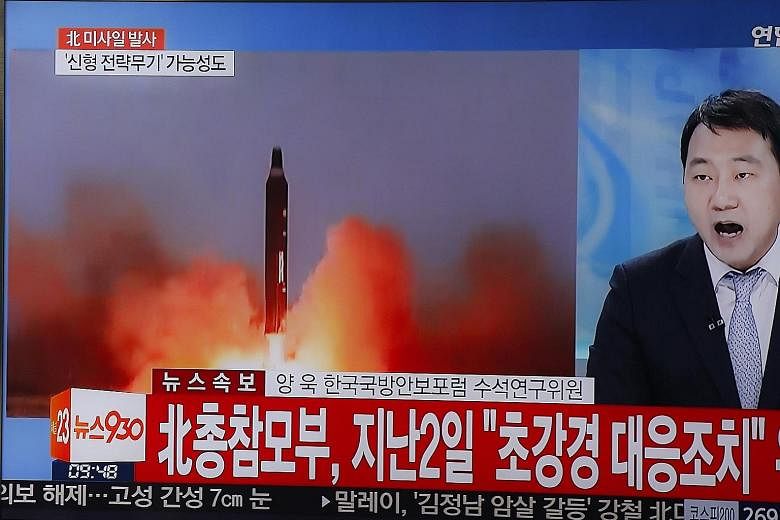North Korea's firing of four ballistic missiles - three of which landed in Japan's exclusive economic zone - has drawn condemnation from Japan, South Korea and their ally, the United States, prompting them to pledge closer collaboration to curb the North's nuclear ambition.
North Korea's ally China, too, slammed the missile tests as they violated the United Nations Security Council resolutions, but also put part of the blame on the US-South Korea drills that began last week.
The missiles were launched yesterday morning from an area near the north-western Tongchang-ri missile site and are widely believed to be in protest against ongoing US-South Korea military exercises. They fell into waters about 350km from Japan's Oga peninsula, leading the country to move to its highest alert level.
Japanese Prime Minister Shinzo Abe warned that Tokyo would not tolerate such repeated acts of aggression, while South Korea's Acting President Hwang Kyo Ahn said it was "an act of outright defiance".
US National Security Adviser H.R. McMaster, in a phone call with his South Korean counterpart Kim Kwan Jin, agreed to enhance bilateral cooperation to adopt sanctions and exert pressure on the North.
Japanese Foreign Minister Fumio Kishida also spoke separately on the phone with US Secretary of State Rex Tillerson and South Korean counterpart Yun Byung Se on boosting collaboration.
Chinese Foreign Ministry spokesman Geng Shuang said "relevant parties should exercise restraint and avoid anything that would provoke each other or heighten regional tensions". He added that Mr Wu Dawei, China's top envoy on the North Korean nuclear issue, had called his counterparts in Washington and Seoul last Friday to warn that the exercises "may widen divisions and complicate the issue".
Dr Bong Young Shik of Yonsei University's Institute for North Korean Studies said that Pyongyang is merely "following through" with earlier threats that it will not sit idle if the annual joint exercises were to continue.
The fact that North Korea fired not just one but four missiles could be a sign that the regime is impatient to push ahead with its nuclear programme, with the ultimate aim of developing a nuclear-tipped intercontinental ballistic missile (ICBM) capable of striking the US, said Sejong Institute analyst Lee Sang Hyun. "(North Korea's leader) Kim Jong Un may believe a nuclear-capable ICBM (will) guarantee the regime's survival. If that's true, North Korea will not stop its programme, no matter the cost."
Yesterday's missile launch, coming after the last one on Feb 12, prompted Acting President Hwang to call for an early deployment of the US Terminal High Altitude Area Defence (Thaad) anti-missile system to better protect South Korea.
But analysts said it would not be technically feasible for the deployment to be completed before July, the planned date.
Beijing is likely to remain sore over Seoul's Thaad decision. Mr Geng said yesterday that Beijing strongly opposed the deployment of Thaad, adding that it damaged the strategic interests of regional countries including China.
The Global Times said in an editorial that those who refused to listen to China's advice and refused to make an effort to reduce tension would only suffer huge losses and have themselves to blame for it.
• Additional reporting by Walter Sim and Goh Sui Noi


